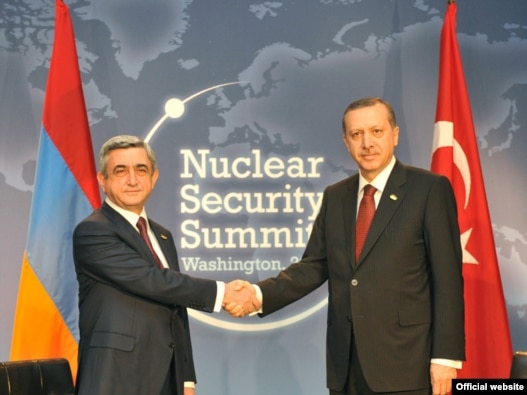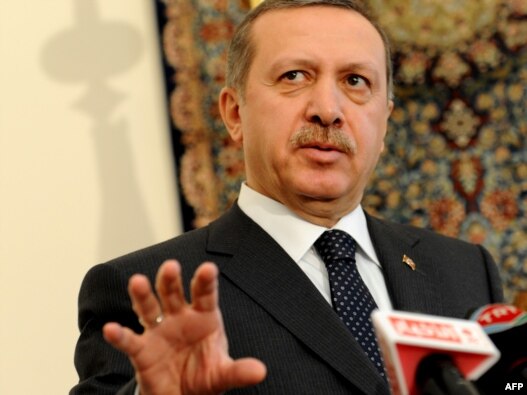 Israeli President Shimon Peres (left) and his Azerbaijani counterpart, Ilham Aliyev, in Baku on June 28, 2009
Israeli President Shimon Peres (left) and his Azerbaijani counterpart, Ilham Aliyev, in Baku on June 28, 2009
Today, however, no such precautions are needed, as visits of Israeli leaders to Azerbaijan are no longer matters of domestic controversy. However, the peculiar relationship of the two countries continues to elude easy characterizations. Some external observers see it as a typical marriage of convenience, while others tend to take it as an alarming threat.
Although Azerbaijan is a predominantly Shi’ite Muslim country and a majority of ethnic Azeris live in neighboring Iran (a ferocious enemy of Israel), Baku routinely shares intelligence with the Jewish state, buys its arms, and considers it trustworthy in security matters, completely contradicting stereotypes about a “clash of civilizations.”
Further, the informal alliance seems to undermine the geopolitical game that the strongest actors — Russia and Iran — are determined to play in the region.
Given how advanced bilateral relations are and how strong the mutual trust appears, it might sound surprising that 18 years of diplomatic contacts have not produced a single official treaty between Israel and Azerbaijan. Moreover, Azerbaijani authorities remain vague to this day about the widely anticipated potential opening of an embassy in Israel.
Why? The answer can be found in Iran.
Thorn In The Side
“Today, everyone understands why Iran wants to block the Azerbaijani-Israeli rapprochement by any means,” Baku-born former Knesset member Yosef Shagal, a major champion of Israeli-Azerbaijani ties, said in an interview with RFE/RL’s Azerbaijani Service. “It is one of the most important strategic priorities of the Islamic republic. Tehran is perfectly aware of the following: the stronger the connection between Baku and Jerusalem, the more weakened Iran will be.”
Iran, which aspires to be a regional leader, would like to see Azerbaijan play by its rules. But Azerbaijan, whose secular system is a thorn in the side of the Islamic regime, not only refuses to conform to Tehran’s dictates but has also crossed a red line by befriending the sworn enemy of Iran’s president.
“It is worth noting the dignity and tact with which Azerbaijani President Ilham Aliyev recommended that his Iranian counterpart refrain from giving advice to a leader of a sovereign state on to whom to show hospitality and to whom to refuse it,” he added.
Although Iran may not be in a position to keep Israel and Azerbaijan completely apart, it has been successful in one respect: Despite numerous calls from the Jewish state, Azerbaijan has still not opened an embassy in Israel because of pressure from Tehran.
This creates a sort of diplomatic asymmetry as it has been 16 years since Israel established its embassy in Azerbaijan. However, Baku has thus far been reluctant to reciprocate. The advanced contacts with Israel have already put a grave chill on Baku’s relations with Tehran, and provoking Iran with an embassy in Israel could prove too costly for Azerbaijan, even triggering a backlash from other Muslim states.
“Repeated efforts by Baku to find out how its southern neighbor would react to opening an Azerbaijani Embassy in Israel have always encountered Iranian ultimatums,” Shagal says, stressing that it would not only be Iranian-Azerbaijani relations that would suffer a massive blow, but Baku would eventually have to pay the price in the area that is of vital importance for the Caucasus republic: Nagorno-Karabakh.
“If Azerbaijan opens an embassy in Israel, then Iran will declare on behalf of the Organization of the Islamic Conference (OIC) a refusal to support Azerbaijan in its conflict with Armenia, and would also disavow all the efforts of Azerbaijan and its supporters in the OIC for the restoration of its territorial integrity and the return of Nagorno-Karabakh,” Shagal says.
Influence Stability
Alexander Murinson, an independent researcher and academic writer who follows developments in Israeli-Azerbaijani relations, is also afraid that Baku could face difficulties once it decides to open the embassy.
“Iran can cause trouble for authorities in Azerbaijan and influence the stability of the country. So obviously that’s another way of Iran trying to influence the diplomatic relationship between Israel and Azerbaijan,” Murinson says.
“Azerbaijan has always felt threatened and continues to feel threatened [by Iran] from an ideological, economic, and political point of view. Iran obviously has a religious network in Azerbaijan that could undermine the secular nature of the current regime in Azerbaijan,” Murinson adds.
Despite those dangers, the IzRus portal reported last month, quoting Israel’s ambassador to Azerbaijan, Michael Lavon-Lotem, that Baku will soon open an embassy in Tel Aviv. Murinson warns that this might be mere posturing, like a similar announcement in 2006. But he believes that this time it could be for real.
“That development has been expected for many years, because the relationship is thriving both in terms of economic trade ties and also in the military field,” Murinson says. “It might be an indication that some agreement has been reached on very deep strategic cooperation between the two parties that may not have been publicized.”
A potential embassy would certainly be a culmination of Israel’s long-term efforts to persuade Baku to formalize relations and could boost Israel’s position abroad.
“For Israel, which is now faced by tremendous diplomatic pressure around the globe for many reasons, when a Muslim country, especially a Shi’ite country, makes this kind of announcement, it indicates for Israel that it has a friend in the region. In such an environment, Azerbaijan making this diplomatic move [would] create a very important, positive dynamic for the state of Israel,” Murinson says.
What’s In It For Baku?
Aran Amnon, an expert on the Middle East who lectures at City University in London, adds that Israel might be now particularly interested in strengthening ties with Baku as the threat of Iranian nuclear capacity takes center stage in Israeli foreign policy.
“Israel has an interest in trying to improve its standing with as many countries as possible, especially those who may be directly affected by Iran and might by persuaded to be supportive of Israeli efforts,” Amnon says.
But in international relations, every nation acts on its own interests. The gains seem obvious for Israel, but why should Baku be willing to take the risk? Murinson links the potential switch to the new dynamics that were created by Turkish-Armenian rapprochement and the deteriorating relations between Ankara and Tel Aviv.
In fact, Baku has a lot of other reasons for being interested in deepening ties with Israel. Israel is an important source of military equipment, and reportedly it was Israel who helped Baku rebuild its army after the heavy losses it suffered during the war over Nagorno-Karabakh. The military aspect of the relationship has been present ever since.
“During the visit of Simon Peres, a very important contract was signed which included construction of a plant in Azerbaijan that would produce unmanned aerial vehicles. By doing so, Azerbaijan would become an important producer of very advanced systems in the region — even Russia doesn’t have advanced unmanned aerial vehicles,” Murinson says, stressing that the lack of such systems proved problematic during the August 2008 Russia-Georgia war.
Israel plays an important role in Azerbaijani security arrangements. The electronic fence around Baku’s international airport was built by Israeli companies. Reportedly, Israeli firms are supplying equipment to ensure the safety of Azerbaijan’s energy infrastructure, and there were also rumors that Israelis provide security for Azerbaijan’s president on his foreign visits.
Last but not least, Azerbaijan is the home of an ancient Jewish community, which remains an important aspect in mutual contacts.
“We estimate that there are approximately 25,000 Jews living in Azerbaijan,” Mark Levin, the executive director of National Conference of the Soviet Jewry says. “Azeri Jews have lived side by side with their non-Jewish neighbors for centuries, and they are treated very well.”



 Armenia — President Serzh Sarkisian (L) meets with Turkish Prime Minister Recep Tayyip Erdogan in Washington, 12Apr2010
Armenia — President Serzh Sarkisian (L) meets with Turkish Prime Minister Recep Tayyip Erdogan in Washington, 12Apr2010



 Saudi Arabia — Turkish Prime Minister Recep Tayyip Erdogan speaks during a press conference in Jeddah, 20Jan2010
Saudi Arabia — Turkish Prime Minister Recep Tayyip Erdogan speaks during a press conference in Jeddah, 20Jan2010
